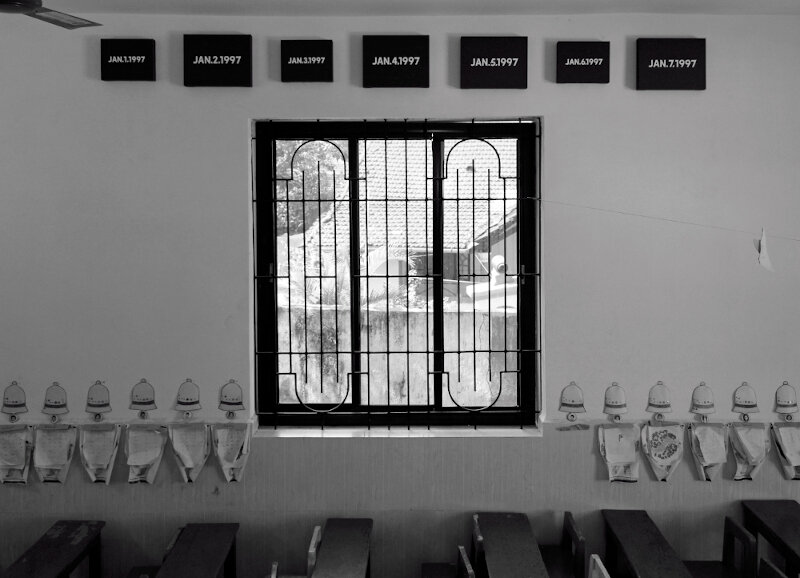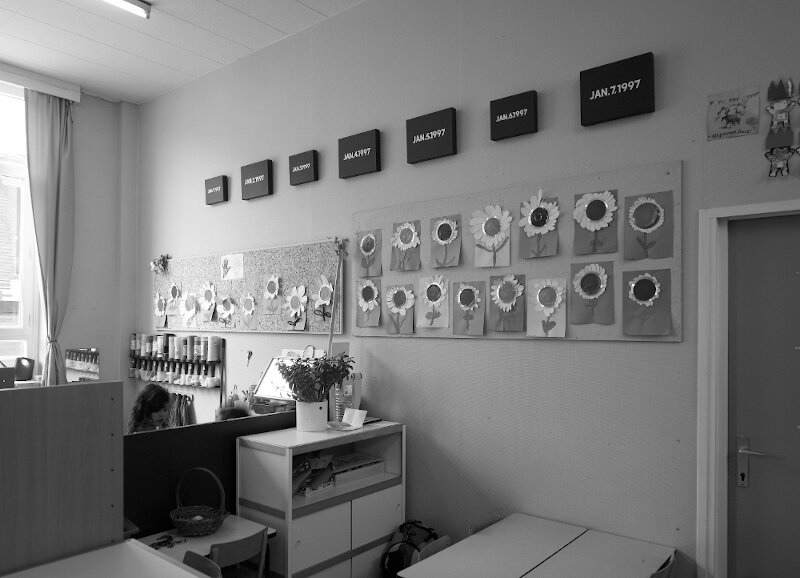PURE CONSCIOUSNESS
1998–
Seven paintings from TODAY (1966–2013)
Acrylic on canvas
JAN. 1, 1997, JAN. 3, 1997, and JAN. 6, 1997
10 × 13 inches (20.3 × 25.4 cm)
JAN. 2, 1997, JAN. 4, 1997, JAN. 5, 1997, and JAN. 7, 1997
8 × 10 inches (25.4 × 33 cm)
1998: Sydney
1999: Reykjavík
2000: Abidjan
2000: Shanghai
2001: Leticia
2001: Istanbul
2002: Avignon
2002: Lund
2003: Toliara
2003: Bad Blankenburg
2004: London
2004: Thimphu
2005: Bequia
2006: Toronto
2006: Shimantogawa
2007: Inari
2007: Bethlehem
2008: New York
2008: Tongyeong
2011: Ostend
2013: Goa
2017: Münster
2018: Ulaanbaatar
2018: Hirosaki
2019: Quebec City
2023: Dazaifu
2024: Montmoreau
2024: Munich
2025: Hong Kong
Pure Consciousness
Pure Consciousness is a traveling installation of seven gray paintings from On Kawara’s Today series (1966–2013) which are exhibited in kindergarten classrooms around the world. For periods ranging from a single day to approximately two months, only children ages four to six “live” with the works.
The set of paintings Kawara chose for Pure Consciousness, painted January 1–7, 1997, reflects the lessons that children at this age learn about fundamentals such as letters, numbers, and time. The consecutive dates are like a counting exercise, for example, and the seven-day span represents that building block of the calendar, the week. The paintings also illustrate size relations, bigger and smaller, as Kawara alternates between formats that differ by just a few square inches, and the slight changes in hue express a subtle but significant relationship between repetition and variation.
The work cannot be called educational, however; education generally has a social aim, and Pure Consciousness does not. Teachers and other adults are not allowed to explain the paintings or respond to students’ queries, nor may they ask the children about their reactions to the works. The paintings are hung high and out of reach; their sole purpose is to merge into the space around them, to blend into the children’s everyday existence and be observed just as they are and nothing more. The title Pure Consciousness reflects this interest in children’s direct and unmediated encounter with the paintings and their apprehension of phenomena unaffected by past experience.
At each stop of Pure Consciousness, a black-and-white booklet of approximately 15 × 20 centimeters is published, noting the exhibition dates and the names of the school, teacher, and children in that class. Documentary photographs show the children learning, playing, even sleeping against the backdrop of the works. Essays contained in these booklets, written by a range of individuals from curators to poets to the classroom teachers themselves, are often remarkably location specific, inadvertently or otherwise, and reflect diverse strains of thought about Kawara’s work.
As Kawara himself did throughout his life, the paintings in Pure Consciousness move around the world to locations remote and unique; they have appeared in twenty-nine classrooms since 1998, and they are intended to continue traveling for years to come. If you are interested in organizing an installation of Pure Consciousness, please contact the One Million Years Foundation.





